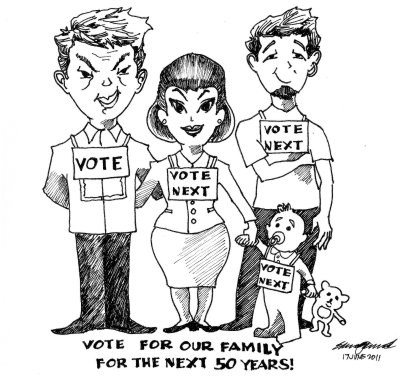| |
.
. |
|
Anti-Political Dynasty bill finally tackled in Congress;
would
cover all national and local elective positions
|
|
from
NAMFREL Election Monitor Vol.2, No.14
|
|
. |
|
Before Congress went on recess last week,
the House Committee on Suffrage and Electoral Reforms conducted for
the first time on June 1 a hearing on the anti-political dynasty
bill filed by Rep. Teddy Casiño, et al. House Bill 3413, filed in
October 2010, originally sought to only ban dynasties in the
provincial, city and municipal levels where they are most commonly
experienced. Casiño said when the bill was formulated, political
dynasties had yet to infiltrate the party-list system. |
After the hearing, Casiño said
the bill will be amended to expand its scope not only to
national electoral posts but also to positions at the
barangay and Sangguniang Kabataan (SK) levels. “The
consensus so far is to expand the scope of HB 3413 to cover
all elective officials from the president, vice president,
senators, district and partylist representatives, local
government positions from governor down to the barangay
level and even the SK," he said in a statement.
The proposed amendments to HB 3413 stemmed from a
recommendation by Commission on Elections (Comelec)
Commissioner Rene Sarmiento to include all elective posts in
the bill against political dynasties. “The prohibition on
political dynasty must also include barangay and SK
positions [so] as to give strength to the letter of the law.
As the basic political unit, the barangay serves as the
primary planning and implementing unit of government
policies," Sarmiento said in a position paper submitted to
the House panel. Sarmiento, on behalf of the poll body, also
expressed support for HB 3413, which he said will
“distribute power to as many people and avoid concentration
to selected few." |
 |
|
HB 3413 defines Political Dynasty as “the
concentration, consolidation or perpetuation of public office and
political power by persons related to one another” and a Political
Dynasty Relationship as “a) when a person who is the spouse of an
incumbent elective official or a relative within the second civil
degree of consanguinity or affinity of an incumbent elective
official holds or runs for an elective office simultaneously with
the incumbent elective official; and b) when two (2) or more persons
who are spouses or are related within the second civil of
consanguinity or affinity run simultaneously for elective public
office, even if neither is so related to an incumbent elective
official.”
Article II, Section 26 of the 1987 Constitution expressly provides:
“The State shall guarantee equal access to public service and
prohibit political dynasty as may be defined by law.”
Bayan Muna started filing its anti-dynasty bill in the 12th Congress
(2001) and no anti-dynasty bill has ever passed the Committee level
so far. Casiño commended the Committee on Suffrage for making
"history by finally starting discussions on the measure."
However, Casiño expressed disappointment that no political party
attended the committee hearing. “It is quite disturbing that none of
the country’s political parties were present during the hearing as
this measure will in fact strengthen them. It is as if these
political parties are only present during election time but are not
interested in fundamental political reforms,” Casiño said.
Casiño said the changes will be introduced to the bill once a
technical working group formed by the Committee
meets on the measure during the legislative break.
Read House Bill 3413 here: http://bit.ly/ljkxo7
(Sources: GMA News, ABS-CBN News, Bayan Muna website) |
|
|
| |
.
.
. |
|
| |
| |
|
|

